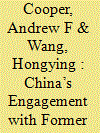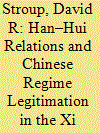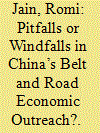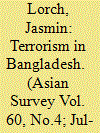|
|
|
Sort Order |
|
|
|
Items / Page
|
|
|
|
|
|
|
| Srl | Item |
| 1 |
ID:
173178


|
|
|
|
|
| Summary/Abstract |
In recent years many former heads of foreign governments have visited China, appearing at various forums, conferences, and other events. China’s engagement with these former leaders may appear to be a form of public diplomacy, but even more importantly it has been a strategy of political legitimation adopted by the Chinese Communist Party. Based on an original database of hundreds of cases, we provide a systematic analysis of the visits of former foreign leaders to China and of their role as external validators for the party-state and its policy initiatives, particularly the Belt and Road Initiative. By shedding light on the Party’s search for external consent and support, we seek to fill a significant gap in the literature, which tends to focus narrowly on the domestic sources of legitimacy and domestic strategies of legitimation.
|
|
|
|
|
|
|
|
|
|
|
|
|
|
|
|
| 2 |
ID:
173177


|
|
|
|
|
| Summary/Abstract |
What areas of the country does the Chinese government prioritize for drinking water provision infrastructure? Chinese policy prioritizes ethnic minorities and minority autonomous areas due to concerns about inequality and interethnic harmony. However, the implementation is not always equitable or favorable for ethnic minorities. Drawing on a new data set of more than 10,000 drinking water projects, I explore how ethnicity and autonomy influence public goods provision in rural Guizhou Province. I find implementation concerns trump official policy priorities when it comes to drinking water infrastructure. Such facilities are more likely to be built in Han-majority areas, because implementation and project completion are easier for officials. The findings have implications for ethnic politics and public goods provision in nondemocratic contexts. They also demonstrate why regions with larger minority populations are often slower to develop and slower to receive better access to basic public services.
|
|
|
|
|
|
|
|
|
|
|
|
|
|
|
|
| 3 |
ID:
173179


|
|
|
|
|
| Summary/Abstract |
The Chinese Communist Party stresses the regime’s role in presiding over the unity of China’s minzu (ethnic groups) and their shared stake in China’s prosperity. However, an examination of the quality of interactions between Han and ethnic minorities illustrates the regime’s vulnerability to counterclaims based on these lived experiences. This paper conducts a case study of Han–Hui relations to argue that physical separation between Han and Hui prevents the two groups from interacting in ways that transmit substantive knowledge about the differences between the groups. Instead, interactions perpetuate stereotypes and distrust. By continuing to push narratives about the unity of all groups and shared family relations, the state highlights the shortcomings of its own policies, and undercuts its own legitimating narrative.
|
|
|
|
|
|
|
|
|
|
|
|
|
|
|
|
| 4 |
ID:
173182


|
|
|
|
|
| Summary/Abstract |
This article examines Japan’s trade policy on significant geo-economic developments by focusing on its engagement in three large free trade agreements: the Trans-Pacific Partnership, the Regional Comprehensive Economic Partnership, and the Japan–EU Economic Partnership Agreement. Under the Abe administration, Japan has produced successful outcomes in mega-FTA strategy, concluding the Comprehensive and Progressive Agreement for Trans-Pacific Partnership and the Japan–EU Economic Partnership Agreement in 2018. The making and diffusion of high-standard rules were given high priority in Japan’s mega-FTA strategy, and Prime Minister Abe’s political leadership in employing his political allies and executive aides and managing the opposition activities of veto players has enabled his administration to produce these successful outcomes.
|
|
|
|
|
|
|
|
|
|
|
|
|
|
|
|
| 5 |
ID:
173180


|
|
|
|
|
| Summary/Abstract |
In just over six years, China’s Belt and Road Initiative has swiftly expanded to vast swaths of the globe, with as many as 138 countries signing on. In 2017, President Xi Jinping’s signature project was incorporated into the Chinese constitution, assuming extraordinary significance as the “project of the century.” China has couched the program in multilateral terms, with a promise of shared benefits through road and maritime connectivity projects, reviving the ancient Silk Road and revivifying the spirit of commercial, cultural and academic exchange. Cooperation among member countries is envisaged in policy coordination, facilities connectivity, unimpeded trade, financial integration, and people-to-people bonds. However, an active debate has ensued surrounding China’s motivations and the initiative’s potential outcomes for the host countries. Against this backdrop, I examine the economic implications for host countries and regions, using a geo-economic analytical framework.
|
|
|
|
|
|
|
|
|
|
|
|
|
|
|
|
| 6 |
ID:
173183


|
|
|
|
|
| Summary/Abstract |
A powerful pro-Palestinian transnational advocacy network has emerged in Malaysia since the Gaza war of 2008–09. Taking the cooperation between the Palestinian Cultural Organization Malaysia, the Islamist Hamas, and the United Malays National Organisation as an example, I analyze the network and argue that the three actors are engaging there to promote the Palestinian struggle for an independent state but at the same time, each actor is using the network to pursue its own interests.
|
|
|
|
|
|
|
|
|
|
|
|
|
|
|
|
| 7 |
ID:
173181


|
|
|
|
|
| Summary/Abstract |
This study analyzes the attitudes of core policy stakeholders in South Korea to multiculturalism and immigrant integration policies, as well as the factors affecting such attitudes, and suggests theoretical and policy implications. I conducted a survey of public officials, program operators, and academics. The responses suggest that public officials, program operators, and academics in Korea have more positive expectations for immigrants’ societal contributions and less fear of social clashes or conflicts due to increasing immigration, compared to the general public. They prefer the assimilationist model, which means that immigrants fully adopt the Korean culture and language as a matter of integration policy. The study sheds light on the stakeholders’ attitudes to multiculturalism and immigration integration policy, how their views differ from the general public, and the causes and policy implications of these differences.
|
|
|
|
|
|
|
|
|
|
|
|
|
|
|
|
| 8 |
ID:
173184


|
|
|
|
|
| Summary/Abstract |
Bangladesh continues to face a threat from Islamic terrorism. However, the drivers of this phenomenon remain under-studied. Research has traced terrorism in Bangladesh to wider processes of Islamization; a political context marked by conflict between the country’s two main political parties and by authoritarian governance; the institutional weakness of the Bangladeshi security and justice system; and international factors, such as the Afghanistan War, influences from the Gulf, and more recently the Rohingya refugee crisis, as well as the increased interest of al-Qaeda and the Islamic State in South Asia. Based on an analysis of the literature and interviews, I argue that while the growth of terrorism in Bangladesh has been a complex process in which all of these factors have interacted, different constellations of them have been decisive at different historical stages.
|
|
|
|
|
|
|
|
|
|
|
|
|
|
|
|
|
|
|
|
|